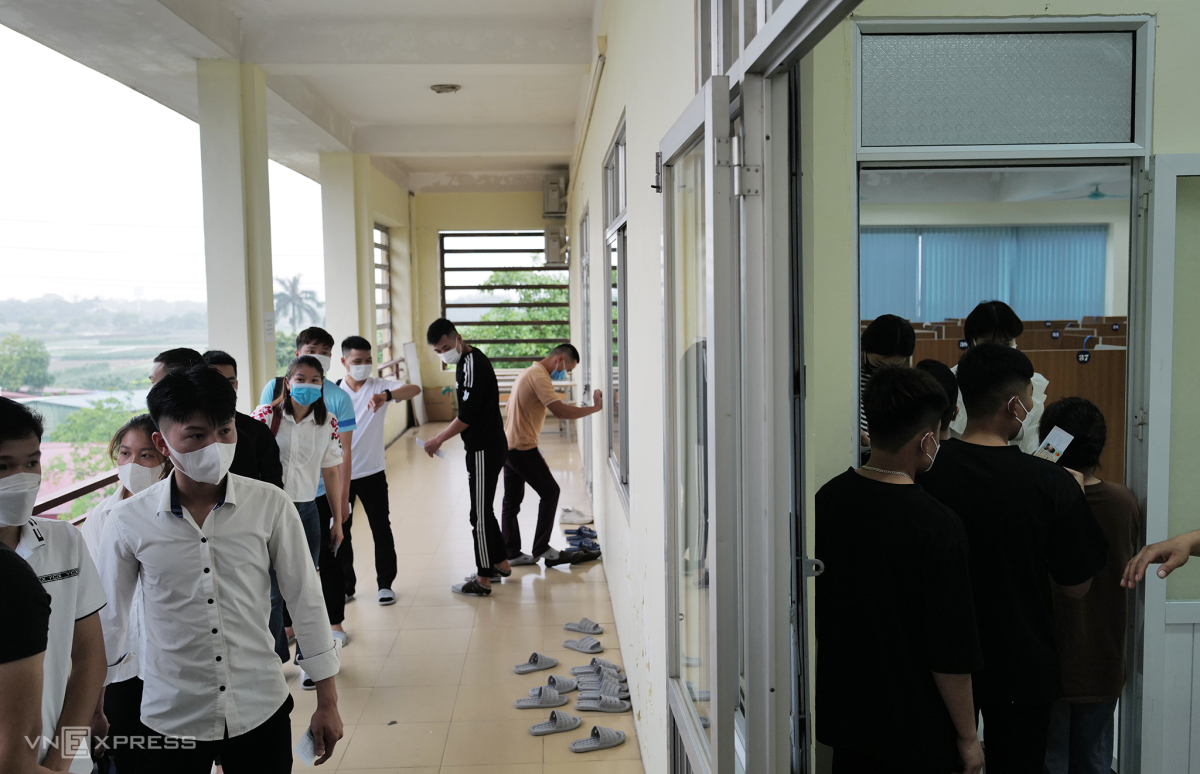The Employment Permit System – Test of Proficiency in Korean (EPS-TOPIK) is being held from May 8 to June 10 in Hanoi, Da Nang and Ho Chi Minh City.
This year, the number of workers who signed up for the test was the largest in 10 years.
Some 23,500 candidates signed up, but at least half of them won't get to work in South Korea at the country plans to recruit only 12,000 people.
Candidates in northern Vietnam take the test at the SONA Vocational Training Center Labor and Training at Hanoi's Me Linh District.
The cool weather due to recent rains was welcomed by many candidates.
Test takers are required to show up half an hour before their scheduled test time in order to have all their personal information cross-checked.
The first round of testing – for workers in the agriculture, fishery and construction fields – takes place through May 13. Over 4,200 candidates signed up for these fields, but South Korea wants to recruit 5,700.
From May 14 to June 10, tests for workers in the manufacturing field will be conducted. Some 19,200 signed up for these fields, while recruitment demand is only 6,300.
Anh Doan, from Bac Kan, sits alone as he reviews his lessons. The 31-year-old wants to travel to South Korea for work due to economic pressure and his need for capital to start his own business.
South Korea has been a labor export market for Vietnam since 1992. Over 90% of workers who come to the country do so through the EPS program, which began in 2004.
The market offers a high income, between $1,400-1,800 a month.
At 8 a.m., workers line up to cross-check information before entering the fingerprint scanning room. Four test sessions of 46 candidates each are held every day.
Nguyen Thi Xuyen, 20, and her cousin from Bac Giang signed up for the agriculture test after two months of studying Korean. They traveled to Hanoi on May 7 and rented an apartment near the test location so they could be at the venue early.
Xuyen is willing to give up her job as a textile factory worker to travel to South Korea due to the potentially high income.
"When I'm still young and have many opportunities, I should go," she said.
Exam passes have candidates' photos for cross-checking. Candidates found having someone else take their test for them will have their results canceled and they will be banned from taking the test again for 4 years.
Candidates need to have their faces and fingerprints scanned in the waiting room.
The Human Resources Development Service of Korea (HRD Korea) is in charge of administering the tests.
The test rooms have surveillance cameras connected directly to the South Korean side.
HRD Korea uses biometric data to verify candidates' identities.
Among the 23,500 people who signed up for the tests, 27 had been removed from the system as they were found to have cheated in the past.
Dang Huy Hong, director of the Center of Overseas Labor, said the exams would be monitored closely, while warning that cheaters would not be allowed to take the tests for 4 years.
"Whoever still has devices for cheating can discard them now before entering the room. If the metal detectors find any device [after one enters the room], it will be regretful," he said.
Metal detectors are used to perform a final check before test takers enter the room.
Once they complete all the precautionary procedures, candidates undergo a 50-minute computer-based test for Korean proficiency. If they pass, they then undergo a skills test.
Test takers leave their belongings behind before entering the exam room.
Both candidates and organizers have said the test is tougher than Vietnam's high school graduation examination.
Test takers undergo several rounds of identity checks before entering the room. Video by VnExpress/Ngoc Thanh, Hong Chieu
















